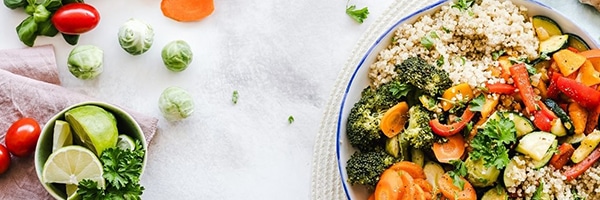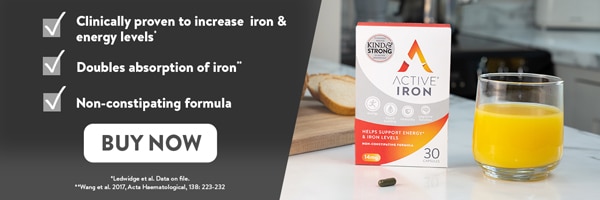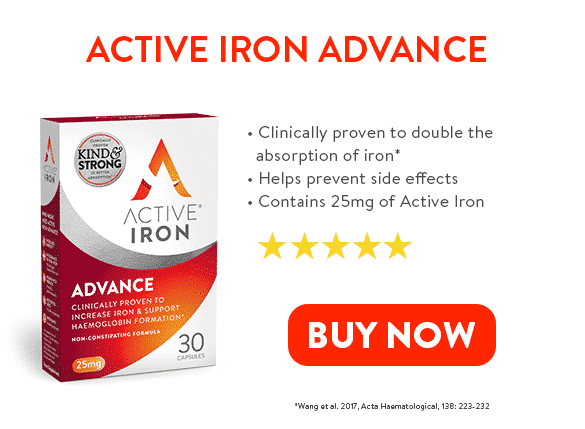If you are considering haem iron supplements, this guide is for you. Using easy-to-understand language and terms, we will take you through all you need to know.
We will answer all your questions, including the following:
- What is haem iron?
- What are the main dietary sources of haem iron?
- What are the different types of iron supplements?
- How much haem iron do I need?
- What are the best types of iron supplements?
Let’s get started by looking at what haem iron is and why it’s such an important mineral.
What is Haem Iron?
Iron is an essential mineral and plays a vital role in the body. It’s used to make red blood cells, which carry oxygen around the body, and it also contributes to normal cognitive function, normal energy metabolism and the normal formation of red blood cells.
There are two different types of iron: haem and non-haem iron. Haem iron mainly comes from animal sources. Red meat, offal, poultry and fish are all excellent sources of iron.
Non-haem iron comes from plant-based sources. These include fortified cereals and breads, rice, oats, nuts, beans and leafy greens. Best of all, dark chocolate is also rich in non-haem iron.
Haem iron is more easily absorbed by the body than non-haem iron. Therefore, vegetarians have to eat twice as much iron as meat-eaters to get the same amount.
The Different Types of Iron Supplements
There are several different types of iron supplements available. These include:
- Ferrous sulfate
- Ferrous gluconate
- Ferric citrate
- Ferric sulfate
Usually available as tablets and capsules, these iron supplements also come as salts or liquids.
However, different types of iron supplements contain varying amounts of elemental iron. Most iron supplements contain non-haem iron.
Haem vs Non-Haem Iron
When it comes to haem vs non-haem iron, the main difference is the body’s rate of iron absorption. Haem iron is absorbed at a much higher rate than non-haem iron. It’s estimated that the body absorbs only 2-20% of non-haem iron. In comparison, haem iron has a 15-35% absorption rate.
Non-haem-based iron supplements are also more likely to result in side effects. Indigestion, stomach upset, flatulence, constipation and diarrhoea are common complaints associated with some types of iron supplements.
While iron is essential to your overall health, some problems are associated with overdoing your intake of haem iron. Dramatically increasing the amount of haem iron in your diet can lead to inflammation, as well as causing damage to gut cells due to the production of hydroxyl, a free radical.
Your body finds it much easier to regulate iron absorption from plant-based foods, meaning that although haem iron is more easily absorbed, the body is not so good at regulating this process. As a result, it’s important to find the right balance of haem vs non-haem iron.
Are They Absorbed Differently?
Just as there’s a difference in how the body absorbs haem and non-haem iron, absorption of iron supplements also varies. A lot depends on how and when you take your iron supplements.
Vitamin C is known to help with iron absorption, and some supplements must be taken with a glass of orange juice to maximise their performance. To get the best absorption, other iron supplements need to be taken alongside food. Even with these measures, lots of people still experience the unwanted side effects of nausea or an upset stomach. By contrast, Active Iron has twice the absorption compared to standard ferrous sulphate supplements, and its gentle formula means you can take it on an empty stomach.
Liquid iron supplements are often proposed as an alternative for those who experience side effects such as constipation or nausea. It’s suggested the liquid format is gentler on the stomach and easier for the body to absorb. However, manufacturers tend to make liquid iron supplements with low potency, as a safety precaution in case a child accidentally drank the liquid iron, which could cause serious health complications.
Furthermore, some foods are known to affect your body’s ability to absorb iron. Healthcare professionals usually advise avoiding taking iron supplements with tea, coffee, milk and dairy products. Wholegrain cereals with high levels of phytic acid are also best avoided.
How Much Haem Iron Do You Need?
How much iron you need depends on your sex, age and lifestyle. Generally, women need more iron than men due to menstruation, pregnancy and breastfeeding.
The EU uses a system called Nutrient Reference Value (NRV), which sets out the average daily amount of vitamins and minerals needed for good health. The NRV for iron is currently 14mg.
The US Department of Health has set out the following recommended daily allowance (RDA) for males and females depending on age.
| Age | Male | Female | Pregnancy | Breastfeeding |
| 1-3 years | 7 mg | 7 mg | ||
| 4-8 years | 10 mg | 10 mg | ||
| 9-13 years | 8 mg | 8 mg | ||
| 14-18 years | 11 mg | 15 mg | 27 mg | 10 mg |
| 19-50 years | 8 mg | 18 mg | 27 mg | 9 mg |
| 51+ years | 8 mg | 8 mg |
The RDA covers iron from all sources, haem and non-haem, plus any iron supplements.
Vegetarians and vegans need to eat twice as much iron in their diet as meat-eaters to achieve their RDA. Haem iron from meat and haem iron supplements is more easily absorbed by the body.
Furthermore, if you are an active athlete, then you may need more iron in your diet, as the body’s muscles use iron to make energy. If you participate in endurance sports such as running, rowing and cycling, increasing your iron intake may enhance your overall performance. Iron helps by transporting oxygen to tired muscles more efficiently.
The Best Types of Iron Supplements
So, what are the best types of iron supplements?
When selecting the right supplement for you, the main things to consider are:
- iron absorption
- potential side effect
When selecting an iron supplement, it is important to focus on one which provides the maximum amount of absorption of iron, while also minimising the side effects.
Now that you know all about haem and non-haem iron, it’s time to discuss iron supplements. In an ideal world, you should get most of your iron intake from your diet. However, some people may be unable to do this or may decide that they need to complement their dietary intake of iron. That’s where iron supplements come in.
Iron supplements provide an easy and convenient way for people to increase their iron intake, but many oral irons on the market are difficult for the body to absorb. Many manufacturers recommend taking their supplements with a source of vitamin C to better aid absorption, although they can still lead to side effects like an upset stomach, constipation, or diarrhoea.
Active Iron is a superior choice to other iron supplements. Being both kind and gentle to the stomach, Active Iron increases the amount of iron absorbed by targeting the body’s natural site of iron absorption, in the intestine. In fact, Active Iron is clinically proven to be more highly absorbed compared to standard iron supplements.*
The ground-breaking technology in Active Iron protects the iron with a special whey layer allowing it to bypass the stomach, where most iron supplements are broken down and oxidised. This means whatever your needs, you will be getting the maximum amount of iron with the satisfaction of reduced side effects.
If you want to increase your iron intake without unwanted side effects, try Active Iron today.
For Athletes
Active exercisers often find they need additional iron in their diets, and they can top up their iron intake during periods of sustained and heavy training with supplements. Intense exercise can put your body under stress, affecting your ability to absorb iron, leading to an ever-increased need.
Active Iron is the answer for many athletes. Active Iron Advance is Certified by the Informed-Sport programme, so athletes can be confident that Active Iron is free from prohibited sports substances.
The unique formulation Active Iron will help increase iron absorption, which in turn helps you give your best performance.
Vegetarians
Many vegetarians, particularly women with periods, find it hard to get enough iron from food sources alone. As we have seen, plant-based non-haem iron is less easily absorbed by the body. However, for ethical reasons, many vegetarians do not want to take heme iron supplements, as this comes from animal sources.
The good news is that Active Iron is a vegetarian-friendly supplement. The unique whey protein formula is also free from artificial preservatives, sugar, wheat and gluten. Active Iron is the preferred choice for many vegetarians wanting to supplement their iron intake.
Pregnant Women
During pregnancy, the body needs more iron to transport oxygen around the body and to support your growing baby. The iron RDA for pregnant women increases from 18 mg to 27 mg. Many women find it a struggle to get all the iron they need during this time, and it can be very easy for pregnant women to develop inadequate iron levels. Once levels have become inadequate, it is nearly impossible to rebuild these levels through diet alone.
Active Iron is a great solution for Pregnant women. Active Iron is safe for consumption prenatally, during pregnancy, and while breastfeeding. Its gentle formula is kind on your stomach, delivering much-needed iron in a non-constipating formula. Active Iron Pregnancy Plus is specially formulated for pregnancy, and is widely recommended by midwives and healthcare professionals.
Haem Iron Supplements Conclusion
Eating a healthy, balanced diet is the best way to ensure you get enough iron – both haem and non-haem. However, sometimes you might need some extra help. Athletes, vegetarians, and pregnant women all have an increased need for iron.
Selecting the right iron supplement is a big decision, as we must consider factors like lifestyle, side effects, and personal iron requirements.
Active Iron is recommended by healthcare professionals and loved by consumers. Its non-constipating formulation is clinically proven to provide a high amount of absorption of iron*, and is gentle on the stomach,*** helping to avoid unwanted side effects. Active Iron is safe for pregnancy, is vegetarian-friendly, and can even be taken on an empty stomach.
*Wang et al. 2017, Acta Haematological, 138: 223-232

Dr Kiran Rahim
MBBS BSc MRCGP
Kiran is a NHS Doctor, specialising in baby, child and adolescent health. She has worked across many London Hospitals and uses her own experience as a mother and south Asian woman to talk about key issues relating to women and child health.
Read more about our expert here.



